Evaluating Eyewitness Testimony: Accuracy, Factors, and Mitigation
VerifiedAdded on 2023/06/15
|6
|1791
|252
Essay
AI Summary
This essay delves into the role of eyewitness testimony within the criminal justice system, emphasizing its importance as a primary source of evidence while also acknowledging its potential for inaccuracy and unreliability. It examines various factors that can impact the accuracy of eyewitness accounts, including personal factors like stress, structural factors such as time delays and the presence of weapons, and investigative factors related to line-up procedures and repeated questioning. The essay further discusses how empirical evidence, gathered through observation and experimentation, can be utilized to mitigate these factors and enhance the reliability of eyewitness testimony, ultimately contributing to a more just and accurate legal process. It concludes by highlighting the need for caution when relying solely on eyewitness testimony for convictions and stresses the importance of considering empirical evidence to improve the accuracy of legal proceedings. Desklib offers additional resources, including past papers and solved assignments, for students studying this topic.
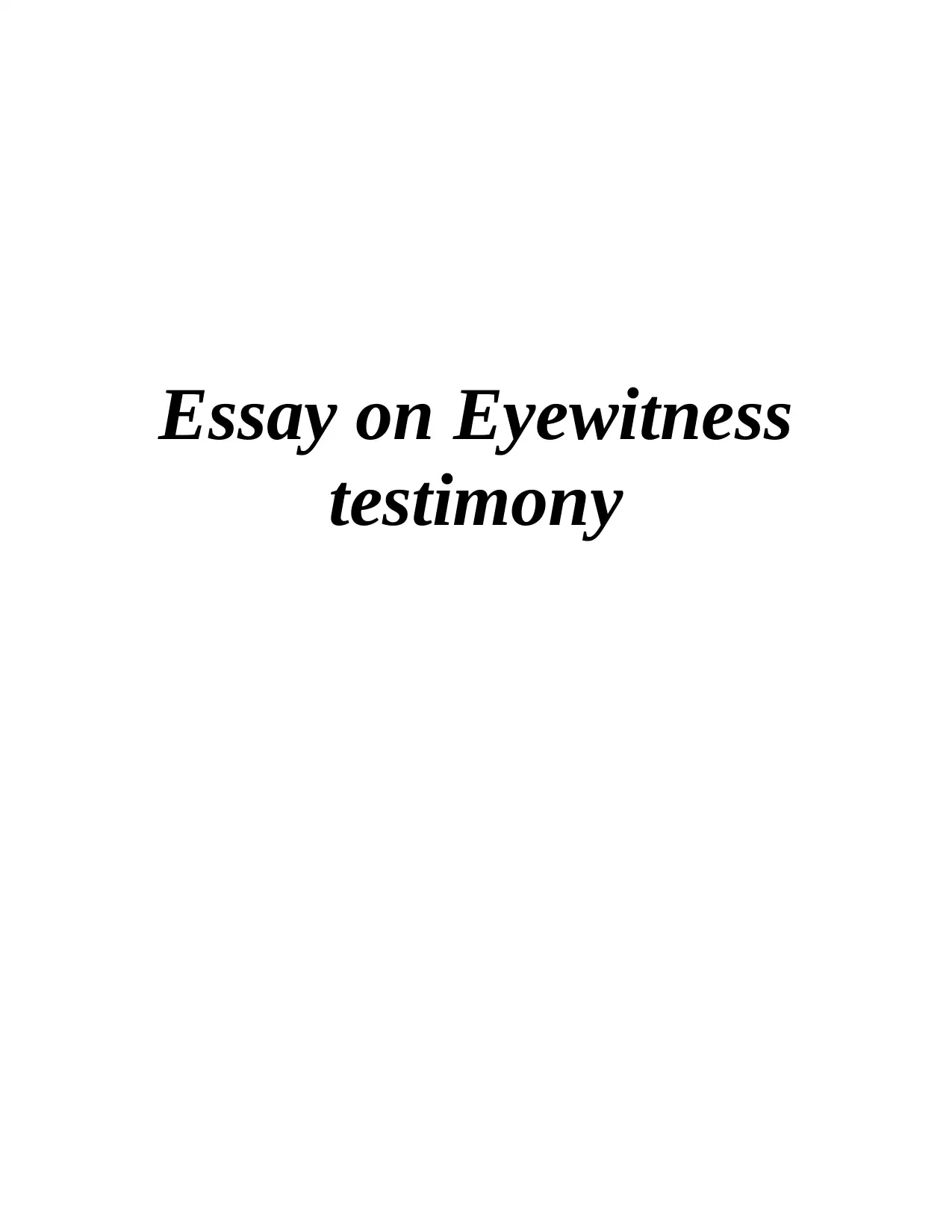
Essay on Eyewitness
testimony
testimony
Paraphrase This Document
Need a fresh take? Get an instant paraphrase of this document with our AI Paraphraser
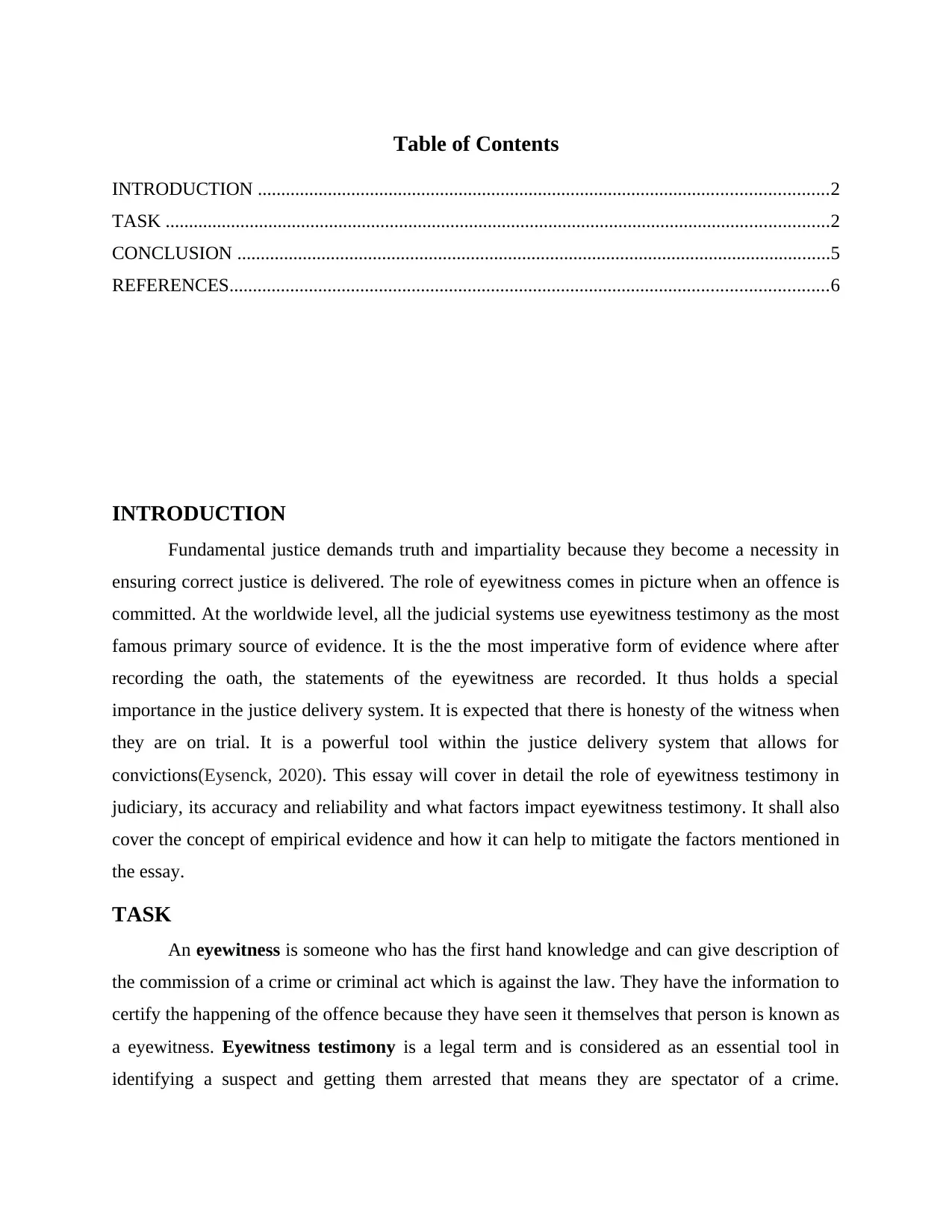
Table of Contents
INTRODUCTION ..........................................................................................................................2
TASK ..............................................................................................................................................2
CONCLUSION ...............................................................................................................................5
REFERENCES................................................................................................................................6
INTRODUCTION
Fundamental justice demands truth and impartiality because they become a necessity in
ensuring correct justice is delivered. The role of eyewitness comes in picture when an offence is
committed. At the worldwide level, all the judicial systems use eyewitness testimony as the most
famous primary source of evidence. It is the the most imperative form of evidence where after
recording the oath, the statements of the eyewitness are recorded. It thus holds a special
importance in the justice delivery system. It is expected that there is honesty of the witness when
they are on trial. It is a powerful tool within the justice delivery system that allows for
convictions(Eysenck, 2020). This essay will cover in detail the role of eyewitness testimony in
judiciary, its accuracy and reliability and what factors impact eyewitness testimony. It shall also
cover the concept of empirical evidence and how it can help to mitigate the factors mentioned in
the essay.
TASK
An eyewitness is someone who has the first hand knowledge and can give description of
the commission of a crime or criminal act which is against the law. They have the information to
certify the happening of the offence because they have seen it themselves that person is known as
a eyewitness. Eyewitness testimony is a legal term and is considered as an essential tool in
identifying a suspect and getting them arrested that means they are spectator of a crime.
INTRODUCTION ..........................................................................................................................2
TASK ..............................................................................................................................................2
CONCLUSION ...............................................................................................................................5
REFERENCES................................................................................................................................6
INTRODUCTION
Fundamental justice demands truth and impartiality because they become a necessity in
ensuring correct justice is delivered. The role of eyewitness comes in picture when an offence is
committed. At the worldwide level, all the judicial systems use eyewitness testimony as the most
famous primary source of evidence. It is the the most imperative form of evidence where after
recording the oath, the statements of the eyewitness are recorded. It thus holds a special
importance in the justice delivery system. It is expected that there is honesty of the witness when
they are on trial. It is a powerful tool within the justice delivery system that allows for
convictions(Eysenck, 2020). This essay will cover in detail the role of eyewitness testimony in
judiciary, its accuracy and reliability and what factors impact eyewitness testimony. It shall also
cover the concept of empirical evidence and how it can help to mitigate the factors mentioned in
the essay.
TASK
An eyewitness is someone who has the first hand knowledge and can give description of
the commission of a crime or criminal act which is against the law. They have the information to
certify the happening of the offence because they have seen it themselves that person is known as
a eyewitness. Eyewitness testimony is a legal term and is considered as an essential tool in
identifying a suspect and getting them arrested that means they are spectator of a crime.
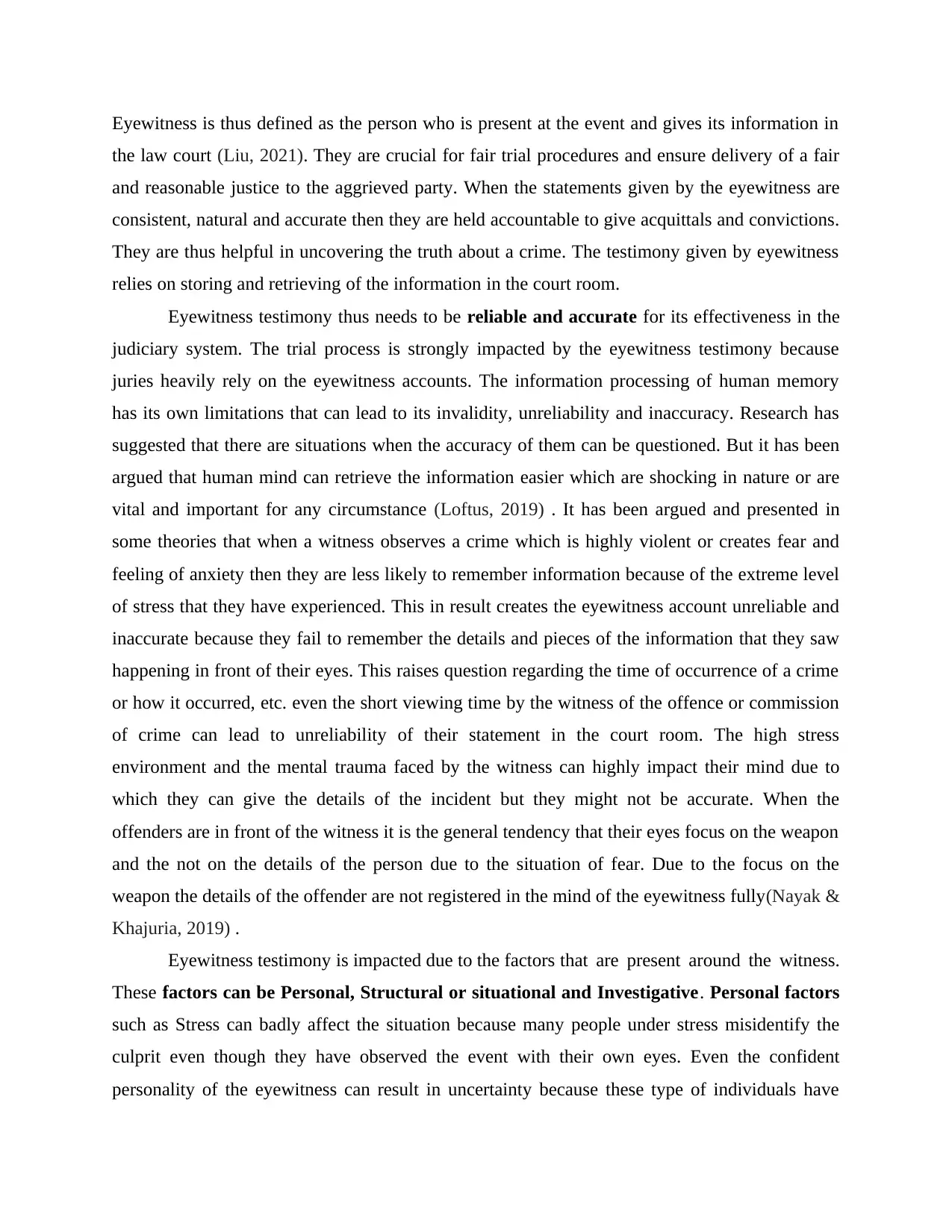
Eyewitness is thus defined as the person who is present at the event and gives its information in
the law court (Liu, 2021). They are crucial for fair trial procedures and ensure delivery of a fair
and reasonable justice to the aggrieved party. When the statements given by the eyewitness are
consistent, natural and accurate then they are held accountable to give acquittals and convictions.
They are thus helpful in uncovering the truth about a crime. The testimony given by eyewitness
relies on storing and retrieving of the information in the court room.
Eyewitness testimony thus needs to be reliable and accurate for its effectiveness in the
judiciary system. The trial process is strongly impacted by the eyewitness testimony because
juries heavily rely on the eyewitness accounts. The information processing of human memory
has its own limitations that can lead to its invalidity, unreliability and inaccuracy. Research has
suggested that there are situations when the accuracy of them can be questioned. But it has been
argued that human mind can retrieve the information easier which are shocking in nature or are
vital and important for any circumstance (Loftus, 2019) . It has been argued and presented in
some theories that when a witness observes a crime which is highly violent or creates fear and
feeling of anxiety then they are less likely to remember information because of the extreme level
of stress that they have experienced. This in result creates the eyewitness account unreliable and
inaccurate because they fail to remember the details and pieces of the information that they saw
happening in front of their eyes. This raises question regarding the time of occurrence of a crime
or how it occurred, etc. even the short viewing time by the witness of the offence or commission
of crime can lead to unreliability of their statement in the court room. The high stress
environment and the mental trauma faced by the witness can highly impact their mind due to
which they can give the details of the incident but they might not be accurate. When the
offenders are in front of the witness it is the general tendency that their eyes focus on the weapon
and the not on the details of the person due to the situation of fear. Due to the focus on the
weapon the details of the offender are not registered in the mind of the eyewitness fully(Nayak &
Khajuria, 2019) .
Eyewitness testimony is impacted due to the factors that are present around the witness.
These factors can be Personal, Structural or situational and Investigative. Personal factors
such as Stress can badly affect the situation because many people under stress misidentify the
culprit even though they have observed the event with their own eyes. Even the confident
personality of the eyewitness can result in uncertainty because these type of individuals have
the law court (Liu, 2021). They are crucial for fair trial procedures and ensure delivery of a fair
and reasonable justice to the aggrieved party. When the statements given by the eyewitness are
consistent, natural and accurate then they are held accountable to give acquittals and convictions.
They are thus helpful in uncovering the truth about a crime. The testimony given by eyewitness
relies on storing and retrieving of the information in the court room.
Eyewitness testimony thus needs to be reliable and accurate for its effectiveness in the
judiciary system. The trial process is strongly impacted by the eyewitness testimony because
juries heavily rely on the eyewitness accounts. The information processing of human memory
has its own limitations that can lead to its invalidity, unreliability and inaccuracy. Research has
suggested that there are situations when the accuracy of them can be questioned. But it has been
argued that human mind can retrieve the information easier which are shocking in nature or are
vital and important for any circumstance (Loftus, 2019) . It has been argued and presented in
some theories that when a witness observes a crime which is highly violent or creates fear and
feeling of anxiety then they are less likely to remember information because of the extreme level
of stress that they have experienced. This in result creates the eyewitness account unreliable and
inaccurate because they fail to remember the details and pieces of the information that they saw
happening in front of their eyes. This raises question regarding the time of occurrence of a crime
or how it occurred, etc. even the short viewing time by the witness of the offence or commission
of crime can lead to unreliability of their statement in the court room. The high stress
environment and the mental trauma faced by the witness can highly impact their mind due to
which they can give the details of the incident but they might not be accurate. When the
offenders are in front of the witness it is the general tendency that their eyes focus on the weapon
and the not on the details of the person due to the situation of fear. Due to the focus on the
weapon the details of the offender are not registered in the mind of the eyewitness fully(Nayak &
Khajuria, 2019) .
Eyewitness testimony is impacted due to the factors that are present around the witness.
These factors can be Personal, Structural or situational and Investigative. Personal factors
such as Stress can badly affect the situation because many people under stress misidentify the
culprit even though they have observed the event with their own eyes. Even the confident
personality of the eyewitness can result in uncertainty because these type of individuals have
⊘ This is a preview!⊘
Do you want full access?
Subscribe today to unlock all pages.

Trusted by 1+ million students worldwide
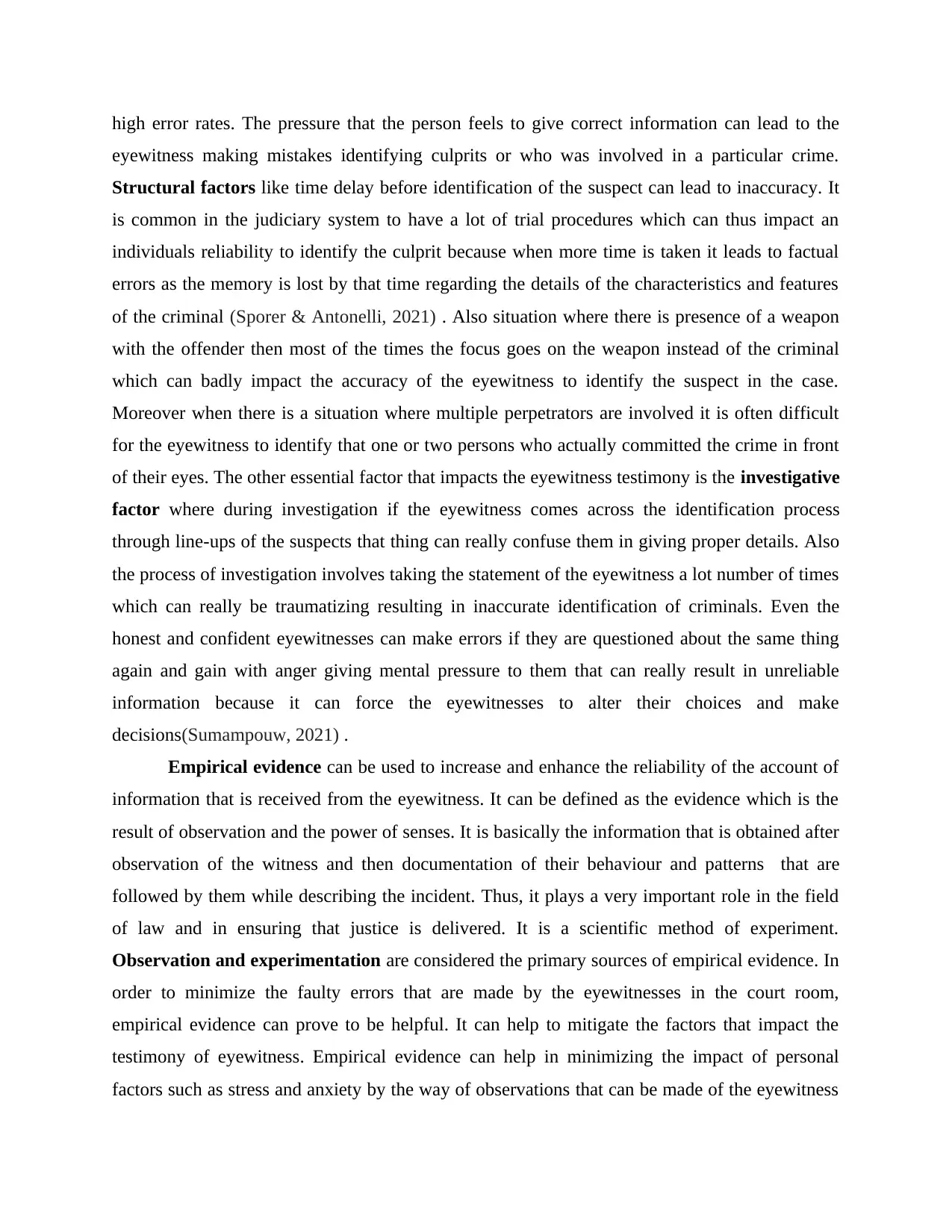
high error rates. The pressure that the person feels to give correct information can lead to the
eyewitness making mistakes identifying culprits or who was involved in a particular crime.
Structural factors like time delay before identification of the suspect can lead to inaccuracy. It
is common in the judiciary system to have a lot of trial procedures which can thus impact an
individuals reliability to identify the culprit because when more time is taken it leads to factual
errors as the memory is lost by that time regarding the details of the characteristics and features
of the criminal (Sporer & Antonelli, 2021) . Also situation where there is presence of a weapon
with the offender then most of the times the focus goes on the weapon instead of the criminal
which can badly impact the accuracy of the eyewitness to identify the suspect in the case.
Moreover when there is a situation where multiple perpetrators are involved it is often difficult
for the eyewitness to identify that one or two persons who actually committed the crime in front
of their eyes. The other essential factor that impacts the eyewitness testimony is the investigative
factor where during investigation if the eyewitness comes across the identification process
through line-ups of the suspects that thing can really confuse them in giving proper details. Also
the process of investigation involves taking the statement of the eyewitness a lot number of times
which can really be traumatizing resulting in inaccurate identification of criminals. Even the
honest and confident eyewitnesses can make errors if they are questioned about the same thing
again and gain with anger giving mental pressure to them that can really result in unreliable
information because it can force the eyewitnesses to alter their choices and make
decisions(Sumampouw, 2021) .
Empirical evidence can be used to increase and enhance the reliability of the account of
information that is received from the eyewitness. It can be defined as the evidence which is the
result of observation and the power of senses. It is basically the information that is obtained after
observation of the witness and then documentation of their behaviour and patterns that are
followed by them while describing the incident. Thus, it plays a very important role in the field
of law and in ensuring that justice is delivered. It is a scientific method of experiment.
Observation and experimentation are considered the primary sources of empirical evidence. In
order to minimize the faulty errors that are made by the eyewitnesses in the court room,
empirical evidence can prove to be helpful. It can help to mitigate the factors that impact the
testimony of eyewitness. Empirical evidence can help in minimizing the impact of personal
factors such as stress and anxiety by the way of observations that can be made of the eyewitness
eyewitness making mistakes identifying culprits or who was involved in a particular crime.
Structural factors like time delay before identification of the suspect can lead to inaccuracy. It
is common in the judiciary system to have a lot of trial procedures which can thus impact an
individuals reliability to identify the culprit because when more time is taken it leads to factual
errors as the memory is lost by that time regarding the details of the characteristics and features
of the criminal (Sporer & Antonelli, 2021) . Also situation where there is presence of a weapon
with the offender then most of the times the focus goes on the weapon instead of the criminal
which can badly impact the accuracy of the eyewitness to identify the suspect in the case.
Moreover when there is a situation where multiple perpetrators are involved it is often difficult
for the eyewitness to identify that one or two persons who actually committed the crime in front
of their eyes. The other essential factor that impacts the eyewitness testimony is the investigative
factor where during investigation if the eyewitness comes across the identification process
through line-ups of the suspects that thing can really confuse them in giving proper details. Also
the process of investigation involves taking the statement of the eyewitness a lot number of times
which can really be traumatizing resulting in inaccurate identification of criminals. Even the
honest and confident eyewitnesses can make errors if they are questioned about the same thing
again and gain with anger giving mental pressure to them that can really result in unreliable
information because it can force the eyewitnesses to alter their choices and make
decisions(Sumampouw, 2021) .
Empirical evidence can be used to increase and enhance the reliability of the account of
information that is received from the eyewitness. It can be defined as the evidence which is the
result of observation and the power of senses. It is basically the information that is obtained after
observation of the witness and then documentation of their behaviour and patterns that are
followed by them while describing the incident. Thus, it plays a very important role in the field
of law and in ensuring that justice is delivered. It is a scientific method of experiment.
Observation and experimentation are considered the primary sources of empirical evidence. In
order to minimize the faulty errors that are made by the eyewitnesses in the court room,
empirical evidence can prove to be helpful. It can help to mitigate the factors that impact the
testimony of eyewitness. Empirical evidence can help in minimizing the impact of personal
factors such as stress and anxiety by the way of observations that can be made of the eyewitness
Paraphrase This Document
Need a fresh take? Get an instant paraphrase of this document with our AI Paraphraser
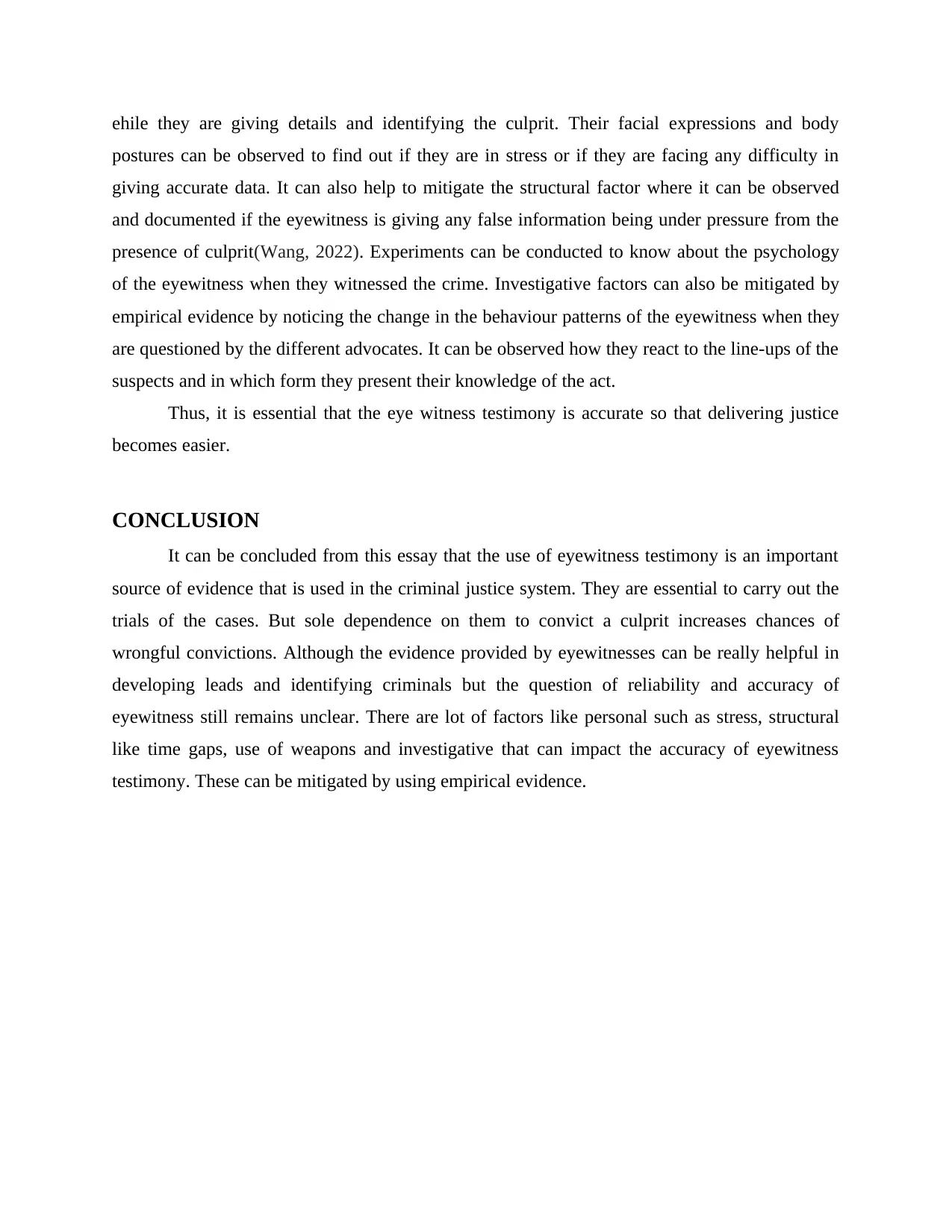
ehile they are giving details and identifying the culprit. Their facial expressions and body
postures can be observed to find out if they are in stress or if they are facing any difficulty in
giving accurate data. It can also help to mitigate the structural factor where it can be observed
and documented if the eyewitness is giving any false information being under pressure from the
presence of culprit(Wang, 2022). Experiments can be conducted to know about the psychology
of the eyewitness when they witnessed the crime. Investigative factors can also be mitigated by
empirical evidence by noticing the change in the behaviour patterns of the eyewitness when they
are questioned by the different advocates. It can be observed how they react to the line-ups of the
suspects and in which form they present their knowledge of the act.
Thus, it is essential that the eye witness testimony is accurate so that delivering justice
becomes easier.
CONCLUSION
It can be concluded from this essay that the use of eyewitness testimony is an important
source of evidence that is used in the criminal justice system. They are essential to carry out the
trials of the cases. But sole dependence on them to convict a culprit increases chances of
wrongful convictions. Although the evidence provided by eyewitnesses can be really helpful in
developing leads and identifying criminals but the question of reliability and accuracy of
eyewitness still remains unclear. There are lot of factors like personal such as stress, structural
like time gaps, use of weapons and investigative that can impact the accuracy of eyewitness
testimony. These can be mitigated by using empirical evidence.
postures can be observed to find out if they are in stress or if they are facing any difficulty in
giving accurate data. It can also help to mitigate the structural factor where it can be observed
and documented if the eyewitness is giving any false information being under pressure from the
presence of culprit(Wang, 2022). Experiments can be conducted to know about the psychology
of the eyewitness when they witnessed the crime. Investigative factors can also be mitigated by
empirical evidence by noticing the change in the behaviour patterns of the eyewitness when they
are questioned by the different advocates. It can be observed how they react to the line-ups of the
suspects and in which form they present their knowledge of the act.
Thus, it is essential that the eye witness testimony is accurate so that delivering justice
becomes easier.
CONCLUSION
It can be concluded from this essay that the use of eyewitness testimony is an important
source of evidence that is used in the criminal justice system. They are essential to carry out the
trials of the cases. But sole dependence on them to convict a culprit increases chances of
wrongful convictions. Although the evidence provided by eyewitnesses can be really helpful in
developing leads and identifying criminals but the question of reliability and accuracy of
eyewitness still remains unclear. There are lot of factors like personal such as stress, structural
like time gaps, use of weapons and investigative that can impact the accuracy of eyewitness
testimony. These can be mitigated by using empirical evidence.
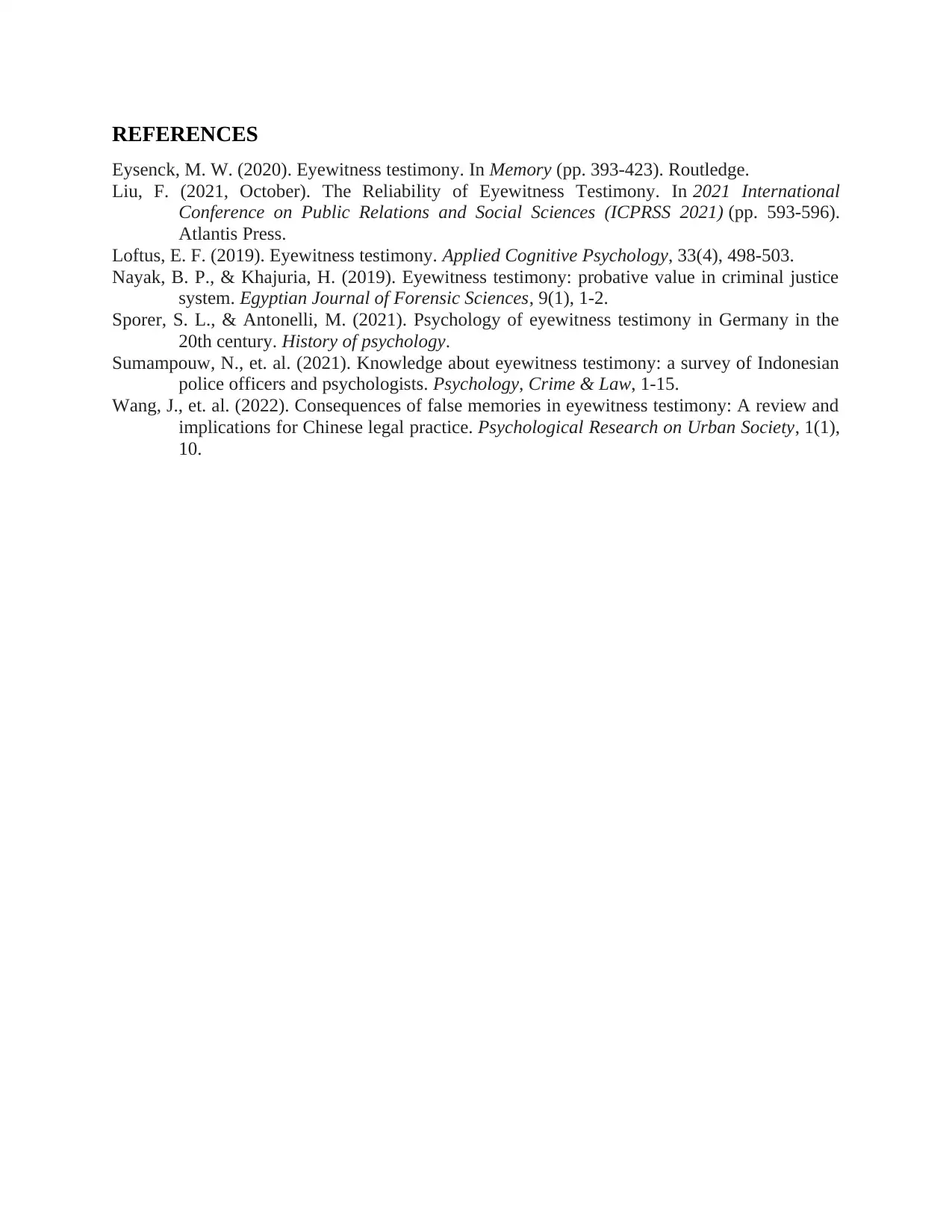
REFERENCES
Eysenck, M. W. (2020). Eyewitness testimony. In Memory (pp. 393-423). Routledge.
Liu, F. (2021, October). The Reliability of Eyewitness Testimony. In 2021 International
Conference on Public Relations and Social Sciences (ICPRSS 2021) (pp. 593-596).
Atlantis Press.
Loftus, E. F. (2019). Eyewitness testimony. Applied Cognitive Psychology, 33(4), 498-503.
Nayak, B. P., & Khajuria, H. (2019). Eyewitness testimony: probative value in criminal justice
system. Egyptian Journal of Forensic Sciences, 9(1), 1-2.
Sporer, S. L., & Antonelli, M. (2021). Psychology of eyewitness testimony in Germany in the
20th century. History of psychology.
Sumampouw, N., et. al. (2021). Knowledge about eyewitness testimony: a survey of Indonesian
police officers and psychologists. Psychology, Crime & Law, 1-15.
Wang, J., et. al. (2022). Consequences of false memories in eyewitness testimony: A review and
implications for Chinese legal practice. Psychological Research on Urban Society, 1(1),
10.
Eysenck, M. W. (2020). Eyewitness testimony. In Memory (pp. 393-423). Routledge.
Liu, F. (2021, October). The Reliability of Eyewitness Testimony. In 2021 International
Conference on Public Relations and Social Sciences (ICPRSS 2021) (pp. 593-596).
Atlantis Press.
Loftus, E. F. (2019). Eyewitness testimony. Applied Cognitive Psychology, 33(4), 498-503.
Nayak, B. P., & Khajuria, H. (2019). Eyewitness testimony: probative value in criminal justice
system. Egyptian Journal of Forensic Sciences, 9(1), 1-2.
Sporer, S. L., & Antonelli, M. (2021). Psychology of eyewitness testimony in Germany in the
20th century. History of psychology.
Sumampouw, N., et. al. (2021). Knowledge about eyewitness testimony: a survey of Indonesian
police officers and psychologists. Psychology, Crime & Law, 1-15.
Wang, J., et. al. (2022). Consequences of false memories in eyewitness testimony: A review and
implications for Chinese legal practice. Psychological Research on Urban Society, 1(1),
10.
⊘ This is a preview!⊘
Do you want full access?
Subscribe today to unlock all pages.

Trusted by 1+ million students worldwide
1 out of 6
Related Documents
Your All-in-One AI-Powered Toolkit for Academic Success.
+13062052269
info@desklib.com
Available 24*7 on WhatsApp / Email
![[object Object]](/_next/static/media/star-bottom.7253800d.svg)
Unlock your academic potential
Copyright © 2020–2025 A2Z Services. All Rights Reserved. Developed and managed by ZUCOL.



